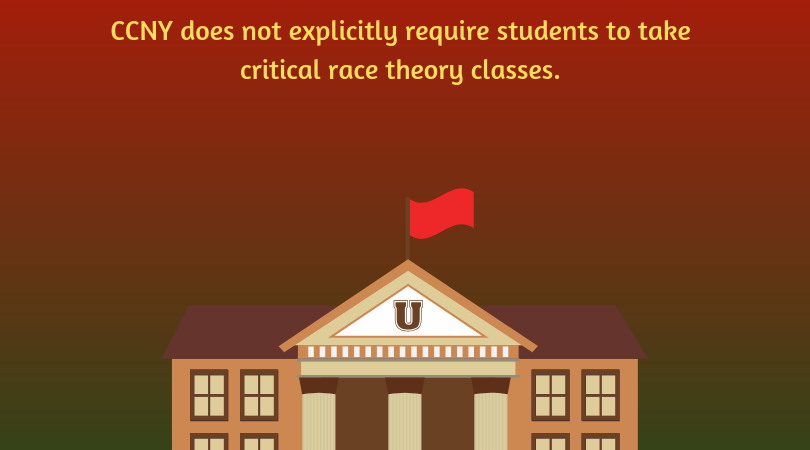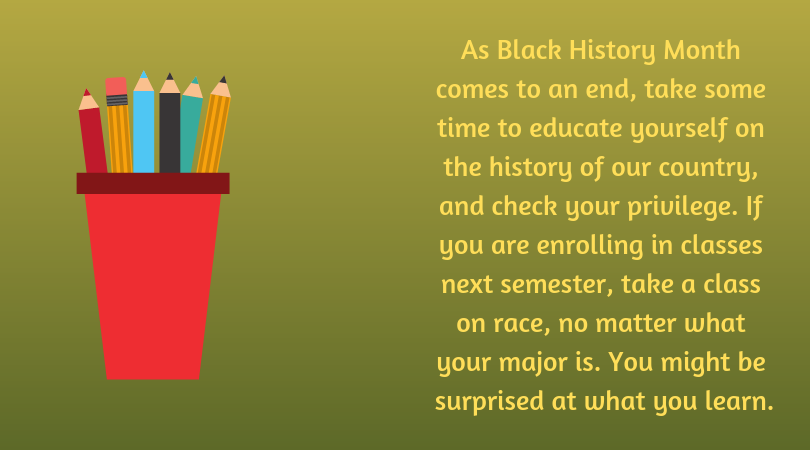Let’s Make Critical Race Theory Courses Mandatory
Words by Michael Alles
Illustration by Katie Herchenroeder
2019 is proving to be an excellent year for racism. Here are some of the highlights in no particular order. A group of white boys in MAGA hats surrounded a Native American elder and taunted him with smiles on their faces, in a video that quickly spread across social media. Virginia governor Ralph Northam is grappling with calls for his resignation after photos resurfaced from his yearbook page, showing a man in blackface and another in a KKK outfit. A University of Oklahoma student has been banned from her campus after a video showed her in blackface using the N-word. In an interview with the Independent, Liam Neeson admitted that he had contemplated murdering a “black bastard.” Gucci has apologized after they released an $890 sweater that can be pulled over the lower half of the face to emulate blackface. James Watson, one of the fathers of DNA, reiterated his unsubstantiated belief that there is a link between race and intelligence in a PBS documentary released in January.

And thatis just the tip of the iceberg.
So, how dowe fix this problem and educate people? A good start would be educatingourselves. CCNY does not explicitly require students to take critical racetheory classes. We have some required areas of study, like math and FIQWS, butnothing for race theory. Unless you are a math or an English major, you willprobably not use calculus or FIQWS in your everyday life. But, the lessonslearned in a critical race course will follow you for the rest of your life.
The MiddleStates Commission on Higher Education, the organization that accredits our universityand universities across the country, writes that their mission is to make surethat “students are well served; that society is well served.” In a deeplyracist society like the United States, introducing mandatory courses on racetheory will not only help students be the best they can be in their prospectivefields, but it will benefit society as a whole. I am not arguing that it willcure the racism that continues to plague our politics and culture, but it wouldbe a start on the right path.
Growing upin Long Island, I was pretty oblivious when it came to issues on race andracism - not as oblivious as some of the people listed above - but I had a lotof learning to do. I still do. My fellow white peers used the n-word with nohesitation, and said soooo manyproblematic things that I was not educated enough to challenge at the time.
Then Icame to CCNY, one of the most diverse campuses in the country. The first classI took centered around race was “Hip-Hop and Social Inequality,” taught by professorL'Heureux Lewis-Mccoy. We learned about the origins of hip-hop, white flight,housing discrimination, and so much more. When I first read Bonilla-Silva’stheory of a tri-racial system, my mind was blown.

Throughoutmy college career, I continued to take classes focused on race theory, bothdomestically and internationally. I still have a lot to learn, and I willcontinue to learn my entire life. Learning about race can be frustrating andleave you with a lot of unanswered questions. Learning about history, learningabout the continued discrimination of people of color, learning about how myprivilege is at the expense of people of color, occasionally makes me want torun away. I want to run away, but not to a place. I want to run away to anidea, something abstract. A place where society was not structured in thisinequitable way. But no such place exists. So where do I go?
I could move to Romania and live with my family. As far as I know, I belong there. But every society has its problems. In Romania, I would be contributing to a system that discriminates against the Roma, or as my family calls them, “gypsies.” But running away from a deeply racist and problematic society won’t fix anything, and I won’t learn anything that way either.
All we cando is continue to educate ourselves. But most people won’t go out of their wayto do so. If that was the case, maybe we wouldn’t be arguing about whyblackface is problematic. Which is the very reason why we need to make thesecourses mandatory.
As BlackHistory Month comes to an end, take some time to educate yourself on thehistory of our country, and check your privilege. If you are enrolling inclasses next semester, take a class on race, no matter what your major is. Youmight be surprised at what you learn.





